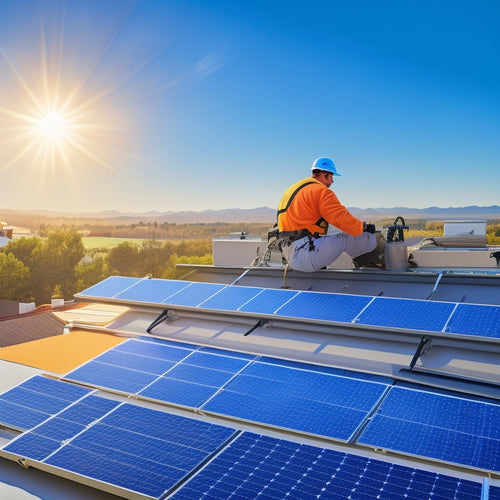
Essential Clean Energy Options for Homes
Share
You're looking to switch to clean energy sources, and rightly so, as they can greatly reduce your reliance on fossil fuels, lower your energy bills, and contribute to a cleaner environment. Essential clean energy options for homes include solar power, which provides energy independence and financial savings; wind energy, which reduces greenhouse gas emissions and offers cost savings; geothermal heating and cooling, which achieves high efficiency and reduces energy consumption; and energy efficiency measures like energy audits, smart thermostats, and appliance upgrades. As you examine these options, you'll unveil how combining them can maximize your savings and environmental benefits.
Key Takeaways
- Hydropower, biomass energy, solar power, wind energy, and geothermal heating and cooling are essential clean energy options for homes.
- Solar power offers energy independence, zero emissions, and long-term financial savings for homeowners with minimal maintenance required.
- Wind energy reduces greenhouse gas emissions, provides cost savings, and has a long lifespan with low maintenance costs.
- Geothermal heating and cooling systems achieve high efficiency, reduce emissions, and provide long-term savings on energy bills.
- Combining clean energy options with energy efficiency measures, such as energy audits and smart thermostats, maximizes savings and environmental benefits.
Renewable Energy Sources Explained
Your electric meter ticks away, silently tallying up the kilowatt-hours of energy consumed by your home. But have you ever stopped to think about where that energy comes from?
Renewable energy sources offer a cleaner, more sustainable alternative to traditional fossil fuels. One of the oldest and most reliable sources is hydropower, which utilizes the energy of moving water to generate electricity. The hydropower advantages are clear: it's a low-emission, high-reliability source of power.
Another option is biomass energy, which converts organic matter like wood chips or agricultural waste into electricity. This renewable energy source reduces greenhouse gas emissions and can even provide heat for your home.
Solar Power for Homeowners
Harness the power of the sun to generate electricity for your home with solar power, a clean and abundant renewable energy source. As a homeowner, you can benefit from solar power in various ways. Not only does it reduce your carbon footprint, but it also saves you money on your electricity bills.
Considering solar power for your home? Here's what you need to know:
| Aspect | Benefit | Description |
|---|---|---|
| Cost | Affordable | With residential solar incentives, the cost of solar panel installation has decreased markedly. |
| Energy Independence | Reliable | Solar power allows you to generate your own electricity, reducing your dependence on the grid. |
| Environmental Impact | Zero Emissions | Solar power is a clean energy source, producing no emissions or pollution. |
| Maintenance | Low | Solar panels require minimal maintenance, making them a hassle-free option. |
Wind Energy Benefits Uncovered
As you investigate alternative clean energy options for your home, wind energy emerges as a promising contender, offering a multitude of benefits that can greatly impact your lifestyle and the environment.
One significant advantage is the reduction in greenhouse gas emissions, contributing to a cleaner and healthier environment.
Residential wind energy systems can also lower your electricity bills, as wind turbines generate free energy once installed.
Additionally, wind turbine advantages include a long lifespan, typically ranging from 20 to 30 years, and low maintenance costs.
Moreover, wind energy is a reliable source of power, as wind is available everywhere, making it an excellent option for rural areas where traditional power lines may not reach.
By utilizing wind energy, you can reduce your reliance on fossil fuels and enjoy a significant decrease in your carbon footprint.
With the right installation, wind energy can be a clean, sustainable, and cost-effective solution for your home's power needs.
Geothermal Heating and Cooling
Nearly 90% of the energy used in homes is consumed by heating and cooling systems, making them a significant contributor to greenhouse gas emissions.
You can reduce your carbon footprint by switching to geothermal heating and cooling, a clean energy solution that utilizes the natural heat of the earth. This system uses a ground source heat pump to extract heat from the earth and distribute it throughout your home.
During the installation process, a network of underground pipes is laid out, which circulates a fluid that absorbs heat from the earth. In winter, this heat is transferred to your home, providing warmth.
In summer, the process is reversed, and the heat is extracted from your home and released back into the ground, cooling your space.
Geothermal heating and cooling systems are highly efficient, with some models achieving up to 400% efficiency. This means that for every unit of electricity used, four units of energy are produced.
Energy Efficiency Essentials
One essential aspect of shifting to clean energy options for your home is focusing on energy efficiency essentials. You can't just install solar panels or geothermal systems and expect your energy bills to plummet. You need to optimize your home's energy usage first. That's where energy audits come in.
A professional energy auditor will identify areas of inefficiency in your home, from insulation gaps to outdated appliances, and provide recommendations for improvement.
Next, you'll want to invest in smart thermostats that can learn your schedule and preferences to optimize heating and cooling. These devices can also be controlled remotely, ensuring you're not wasting energy when you're not home.
Additionally, consider upgrading to energy-efficient appliances and lighting, and seal any air leaks to prevent heat from escaping.
Frequently Asked Questions
Can I Use Clean Energy Systems if I Rent My Home?
You can investigate clean energy options even as a renter, but be prepared to manage rental restrictions. Consider portable solar solutions that don't require installation, allowing you to utilize power without modifying your rental property.
How Do I Choose the Right Clean Energy Installer for My Project?
When selecting a clean energy installer, you'll want to vet their qualifications, confirming they have relevant certifications and experience with projects similar to yours. Also, be sure to discuss project timelines, asking about their workflow, milestones, and expected completion dates to guarantee a smooth installation process.
Are Clean Energy Systems Expensive to Maintain?
You're wondering if clean energy systems break the bank on maintenance? Not necessarily. Conduct a cost comparison to uncover that while upfront costs may be higher, maintenance benefits like reduced wear and tear can lead to long-term savings.
Can I Use Clean Energy to Power My Electric Vehicle?
You're driving towards a sustainable future, and you're wondering if clean energy can fuel your electric vehicle. Yes, you can utilize solar power for charging, and energy storage systems guarantee a steady supply, giving you the freedom to go the distance.
Do Clean Energy Systems Work During Power Outages?
You're wondering if clean energy systems keep you powered during outages. Yes, they can. A solar battery, like Tesla's Powerwall, stores excess energy for later use, while backup generators, like diesel or natural gas, provide additional reliable power during extended outages.
Related Posts
-

Why Higher Upfront Costs Are Worth It
You pay a premium for high-quality, energy-efficient products, but they're worth it. With durability testing ensuring...
-

What Makes a Road Bike-Friendly by Design?
As you plan and design roads, incorporating features like dedicated bike lanes, smooth surfaces, and traffic calming ...
-

3 Essential Steps for Solar Electricity Installation
To guarantee a successful solar electricity installation, you'll need to follow three essential steps. First, assess ...


